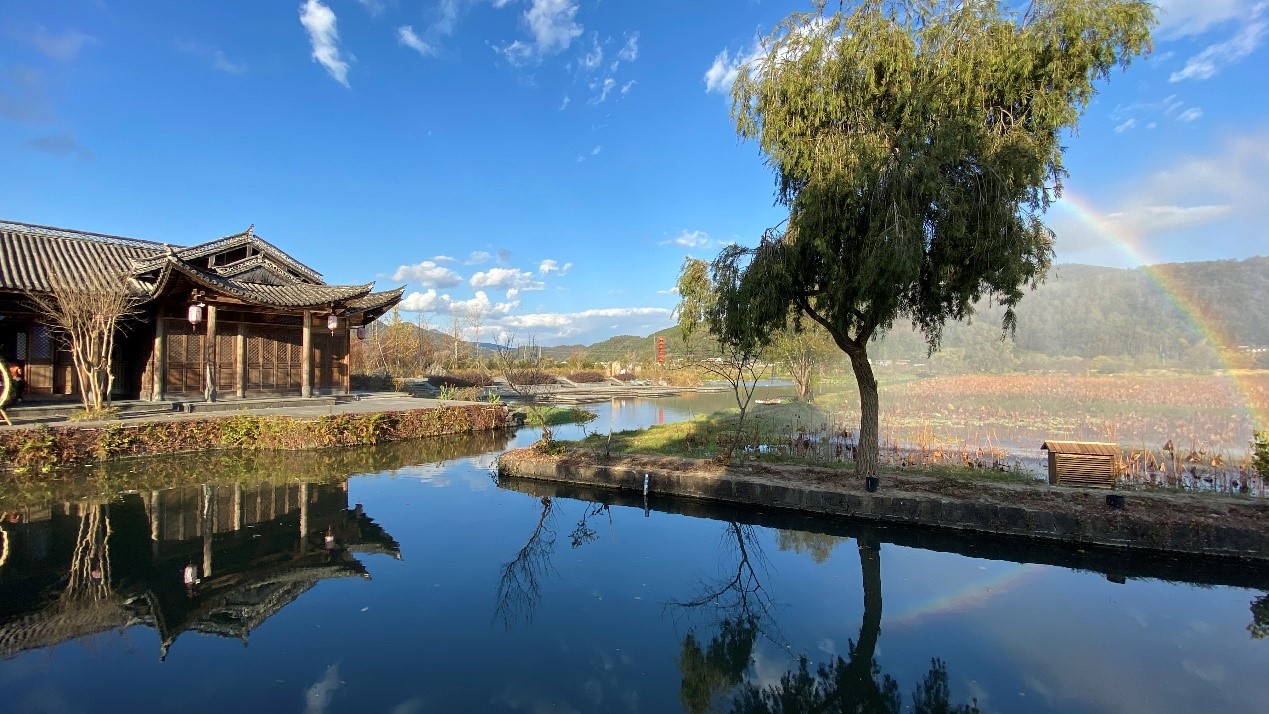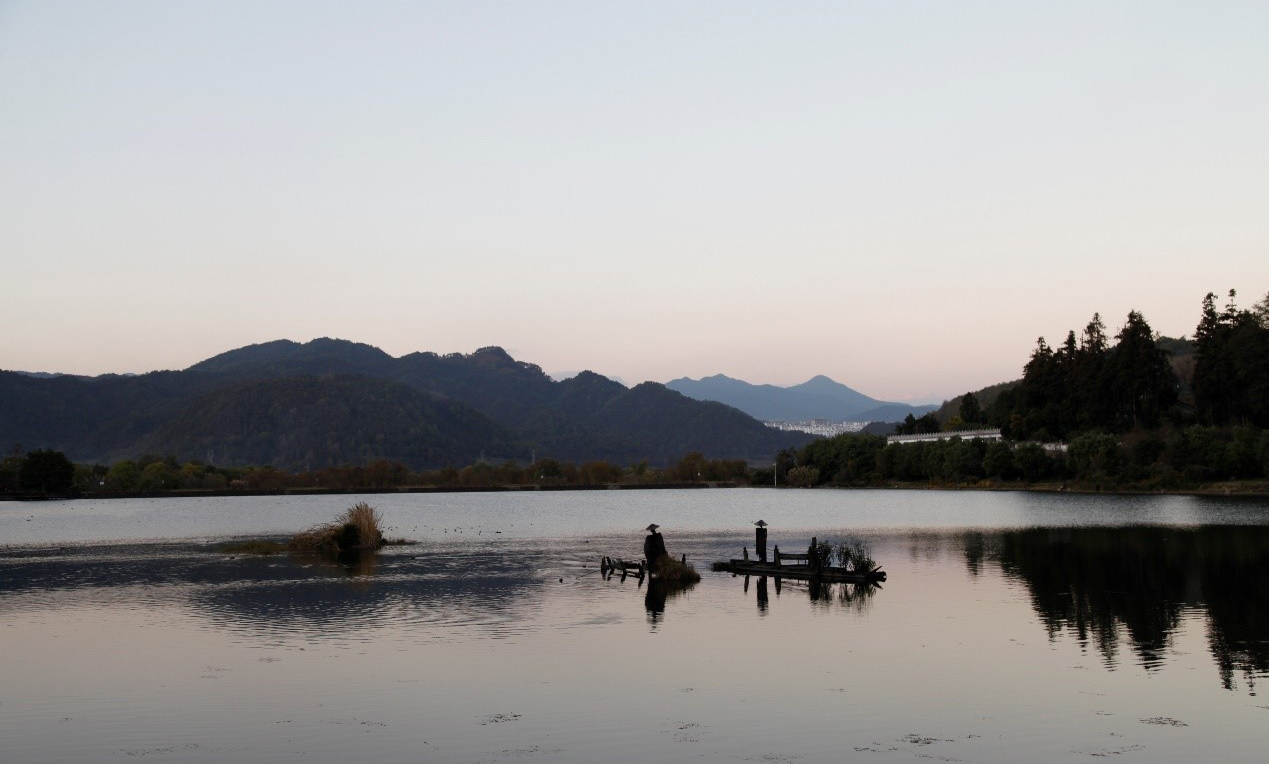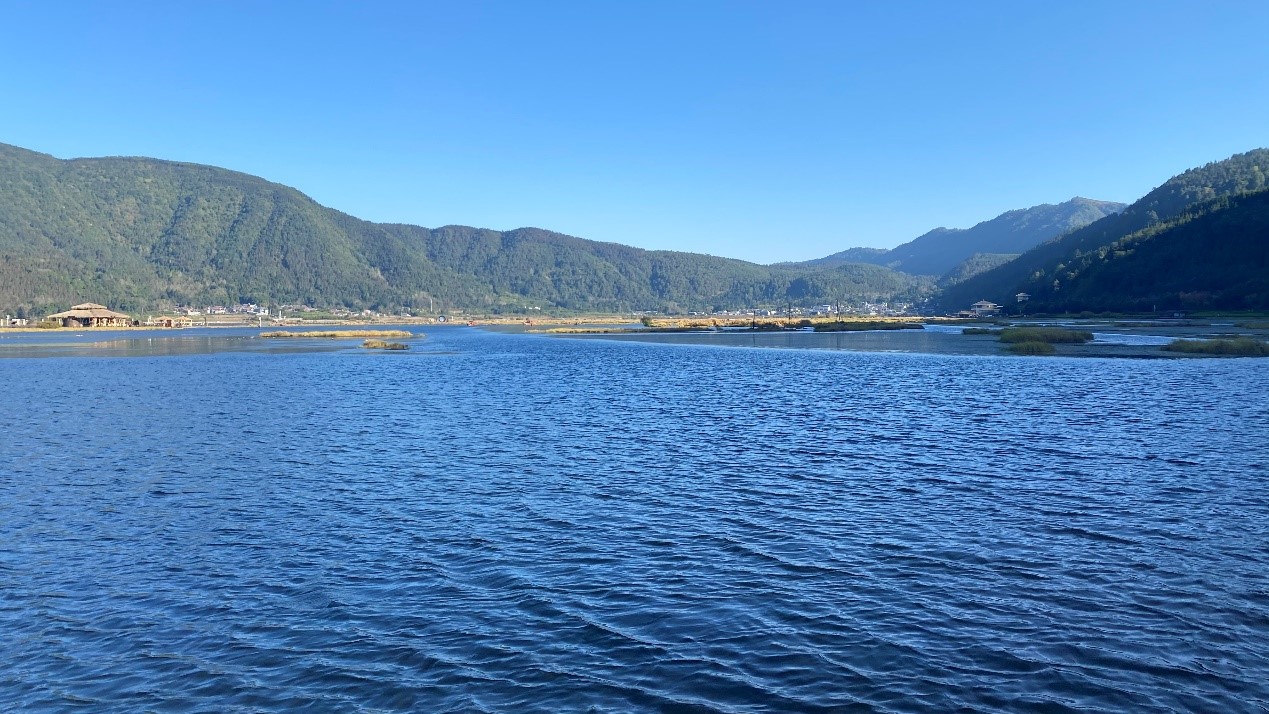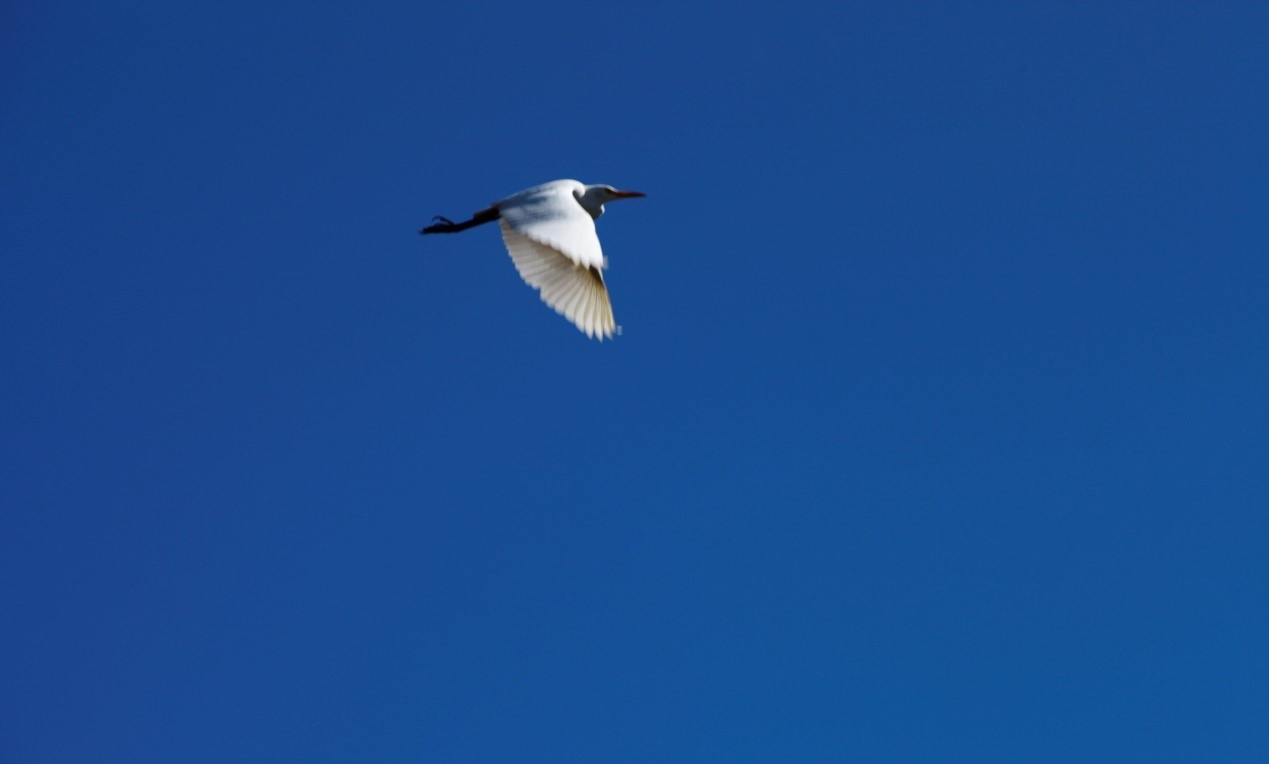

In 1639, Xu Xiake, the legendary Chinese travel writer and geographer, went on a journey to Tengchong. Mesmerized by its rugged mountains, stunning hot springs and enchanting landscape, he lingered for 39 days and later recorded the scenery he witnessed into The Travel Diaries of Xu Xiake, a classic Chinese travelogue book.
382 years on, Tengchong, now a county-level city in southwest China's Yunnan Province, is still embracing travelers with its constant appeal and allure, the same beauty in the eyes of Xu Xiake, Tengchong's very first reviewer.
Harmony between humans and the environment
Upon landing at the Tengchong Tuofeng Airport, you can relate to Henry David Thoreau's words in his masterpiece Walden that "Heaven is under our feet as well as over our heads." The misty hills stretching along the skyline are so vividly striking that your eyes need time to adjust and process. The marshmallow-like clouds decorating the azure sky hang so low that you may have the impulse to grab a piece. Such a landscape at the entrance of the city serves as a perfect invitation to the place.
Beauty has never been in short supply in Tengchong, which is home to plenty of scenic spots, wetlands and nature reserves. Among which, Heshun Ancient Town sets the perfect example of how to seek harmony between humans and the environment.

A tree, rainbow, and building, together with their reflections, form a picture-perfect landscape in Heshun Ancient Town, Tengchong County, southwest China's Yunnan Province, Dec. 7, 2020. (People's Daily Online/Meng Bin)
Stepping onto the flagstone walkway in Heshun Ancient Town immediately brings you back to the primitive and idyllic life that is still lived by the town's some 6,000 inhabitants. Though now a national 5A tourist attraction with tens of thousands of visitors each day, the 600-year-old town still preserves its unsophisticated and unspoiled sides.
In the vast tracts of paddy fields that sit at the east corner of the town, farmers are busy collecting crop residues while happily acting as the background in photos taken by elated tourists. Occasionally, you can see grandmothers sitting on stone benches chatting about affairs in the local dialect or children running about the alleys, regardless of the passers-by that come from all across the country.

Villagers wash their laundry at the laundry booth in Heshun Ancient Town, Dec. 7, 2020. (People's Daily Online/Meng Bin)
If you visit the town on a sunny day, you may see villagers washing their laundry at the laundry booth, an old practice one can hardly find in the contemporary world that is filled with an assortment of washing machines. Hand-washed floral bed sheets and clothing are usually hung on the nearby branches or bridge railings before getting picked up at dusk, bringing with them the mellow smell of sunshine and grass to their owners' homes and dreams.
The residents of the town seem to always maintain a secluded state of mind. Even the animal dwellers won't be distracted by the flowing swarm of tourists. At times, you can witness a goose strutting by the pond, clucking hard to clear its way, or a flock of ducks walking slowly towards the water, aiming for afternoon snacks. Such scenes are always a reminder that we travelers are merely outsiders and observers. At the end of the day, this is the place those human and animal inhabitants call home.

The reflection of a yellow-green tree melts into the shimmering river at Heshun Ancient Town, Tengchong County, southwest China's Yunnan Province, Dec. 7, 2020. (People's Daily Online/Meng Bin)
To develop tourism while minimizing its impact on the residents and the environment isn't an easy task. As Pu Yazeng, mayor of Heshun Ancient Town, puts it, continued efforts are needed to preserve and improve the town's ecology and environment.
"Take the town's aquatic ecology as an example. In recent years, we have built a sewage treatment plant and set up sewer lines to enhance the water quality," Pu told People's Daily Online. "For the next step, we are going to enrich the vegetation on the surrounding hills and upgrade the nearby forest land."
With all the endeavors to protect the ecology and environment, Pu Yazeng believes that the town can always be a place for tourists to find those feelings of nostalgia.

The remnant light at dusk gives a sense of tranquility and tenderness in Heshun Ancient Town, Tengchong County, southwest China's Yunnan Province, Dec. 7, 2020. (People's Daily Online/Zhou Yu)
A symphony orchestrated by nature
For those chained to the rhythm of fast modern life, with ears bombarded by all sorts of artificial noises and eyes worn out from staring at the dazzling screens, there is nothing more soothing and healing than the chirp of a bird, the touch of a breeze, and the view of a deep blue lake. Beihai Wetland in northwest Tengchong is a perfect spot to find that combination.
The wetland, formed by volcanic eruptions millions of years ago, makes a unique plateau volcanic barrier lake ecosystem that centers around Beihai Lake.

Water glistens at the national level wetland reserve Beihai Wetland,in southwest China's Yunnan Province, December 8,2020. (People's Daily Online/Meng Bin)
Roaming along the vast expanse of the lake, you can have a fine view from every angle. "Picture-perfect" is even insufficient to describe its stunning beauty, for the natural scenery can effortlessly eclipse any paintings or photographs. It is the time you realize that the secret to a good photo shoot is not an expensive camera but the scenery itself.
The best way to tour Beihai Wetland, which is dominated by water and swamps, is by raft (made of clay and mud), as your eyes can zoom in on the detailed aquatic scenery deep into the lake.

Beihai Wetland, covering an area of about 16 square kilometers, is renowned for its tranquil scenery, which is dominated by water and the surrounding mountains, Dec. 8, 2020. (People's Daily Online/Meng Bin)
Drifting on the placid waters of the lake is a refreshment of your senses and an immersive meditation experience. For that moment, you can indulge yourself in the intoxicating view. The inverted image of the clear blue sky and the lush hills surrounding the lake melts together in the water, reflecting a rich and soothing mix of colors to your eyes. Apart from the various shades of blue, you can also see duckweed spreading sporadically on the surface of the lake like green polka dots embroidered on a huge blue blanket.

Rootless duckweed floats on the surface of the Beihai Lake in Beihai Wetland, Tengchong County, southwest China’s Yunnan Province, Dec. 8, 2020. (People’s Daily Online/Meng Bin)
If the duckweed is decorating the lake, then the water grasses are defining it. The water grasses on the surface of the lake grow so exuberantly that they earn the wetland the name "grassland on the water." Small as they are, the swards are like natural magnets, offering a perfect shelter for wild animals.
You can hear the birdsong before you can even catch sight of the birds. Hovering on the sky or resting in the cover of the water grasses, those wild birds are the gift of the wetland and also a testament to the unremitting endeavors to preserve the delicate ecosystem.
In 1994, Beihai Wetland was listed on the first 33 national key wetlands in China, and it still stands as the only national-level wetland reserve in Yunnan Province. Within the wetland, you can trace the omnipresent environmental and ecological protection efforts.

A purple swamphen, a protected bird, rests on marsh grass in Beihai Wetland, which is home to a host of protected animals and plants, Dec. 8, 2020. (People's Daily Online/Zhou Yu)
The billboards at the entrance of Beihai Wetland Reserve showcases the endangered wild plants and animals that the wetland houses, including watershield (a national key protected wild plant), the purple swamphen (a protected bird) and black stork, etc.
Even the nameless flowers on the clay-made rafts are well protected. "Rafts with flowers growing on it can't be taken," the staff working at the wetland reserve said, "…so as to spare it from being trampled by tourists." Here in Tengchong's Beihai Wetland, every life gets its place.

A water bird soars against the deep blue sky in Beihai Wetland, Tengchong, Yunnan Province, Dec. 8, 2020. (People's Daily Online/Fu Hao)
In the lush mountains and clean waters, Tengchong finds its pure and rich nature, a value that never fades, ageing gracefully over time.

 Award-winning photos show poverty reduction achievements in NE China's Jilin province
Award-winning photos show poverty reduction achievements in NE China's Jilin province People dance to greet advent of New Year in Ameiqituo Town, Guizhou
People dance to greet advent of New Year in Ameiqituo Town, Guizhou Fire brigade in Shanghai holds group wedding
Fire brigade in Shanghai holds group wedding Tourists enjoy ice sculptures in Datan Town, north China
Tourists enjoy ice sculptures in Datan Town, north China Sunset scenery of Dayan Pagoda in Xi'an
Sunset scenery of Dayan Pagoda in Xi'an Tourists have fun at scenic spot in Nanlong Town, NW China
Tourists have fun at scenic spot in Nanlong Town, NW China Harbin attracts tourists by making best use of ice in winter
Harbin attracts tourists by making best use of ice in winter In pics: FIS Alpine Ski Women's World Cup Slalom
In pics: FIS Alpine Ski Women's World Cup Slalom Black-necked cranes rest at reservoir in Lhunzhub County, Lhasa
Black-necked cranes rest at reservoir in Lhunzhub County, Lhasa China's FAST telescope will be available to foreign scientists in April
China's FAST telescope will be available to foreign scientists in April